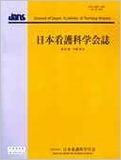Japanese
English
- 販売していません
- Abstract 文献概要
- 参考文献 Reference
要旨
目的:特別養護老人ホーム入所者の終末期に関わる多職種チームケアによって得られる成果とその構造を明らかにし,チームが目指す成果を検討する.
方法:専門職員を対象とした全国アンケート調査,職種別のフォーカス・グループ・インタビュー(FGI),多職種チームFGIによって得た質的データを質的帰納的に分析しカテゴリの関係を検討した.
結果:【本人が望んだ生活の維持と死】【本人と家族のよい関係】【家族の参加と不安の軽減】【他の入所者が死を肯定的に受け入れ】【チームケアの質の向上】【職員の成長と満足】【施設全体のケアの質の向上】の7カテゴリが見出された.【本人が望んだ生活の維持と死】【本人と家族のよい関係】【家族の参加と不安の軽減】【他の入所者が死を肯定的に受け入れ】【チームケアの質の向上】はチームケアによる直接的成果であり,残りの2カテゴリは間接的成果であった.
結論:直接的成果を指標に多職種チームで評価しケアを展開することで,よりよい終末期ケアの実施が期待できると示唆された.
Purpose: The aims of this study were to evaluate the outcomes achieved through terminal-phase inter-professional team care for residents of special nursing homes for the elderly and clarify the structure of such outcomes. This study also aimed to discuss the future outcome that the team would aim for.
Methods: A nationwide questionnaire survey of the health professional staff and focus group interviews (FGIs) with each type of professionals were conducted. The data obtained from FGIs with inter-professional team care members were qualitatively and inductively analyzed to investigate the relationship between the categories extracted by analysis.
Results: The following seven categories were identified: 1) maintaining lifestyles that residents desire and desirable death for him/herself, 2) good relationships between the residents and their families, 3) family participation in care practice and relief of residents' anxiety, 4) positive acceptance of death by other residents, 5) improvement of the quality of team care, 6) staff development and satisfaction, and 7) improvement of the facility's overall quality of care. The first five categories were direct outcomes of inter-professional team care. The last two categories were indirect outcomes.
Conclusion: The results of this study suggested that developing inter-professional team care with direct outcomes as indicators could improve the quality of terminal care.
Copyright © 2017, Japan Academy of Nursing Science. All rights reserved.


